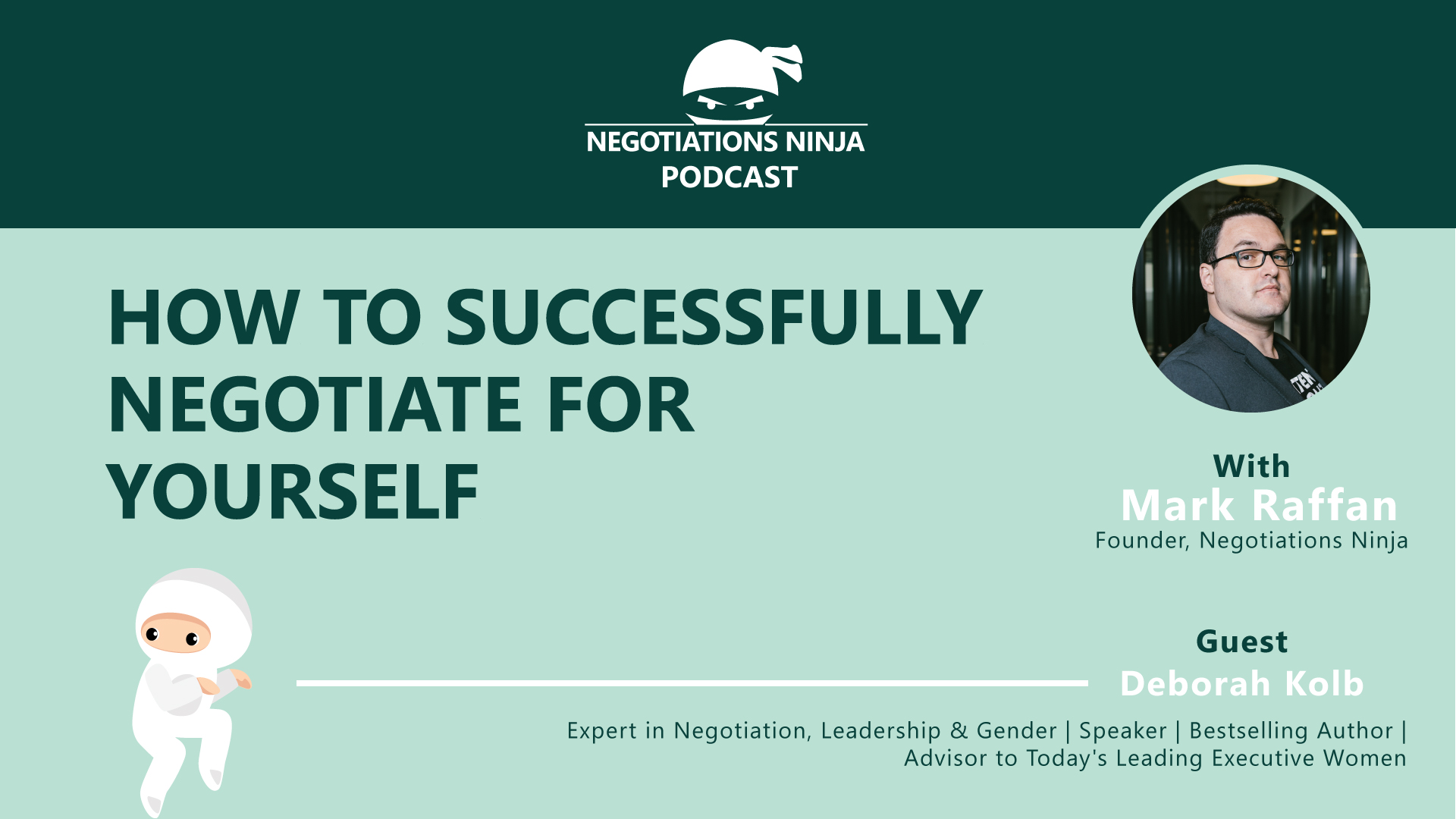How do you negotiate for yourself, as opposed to an organization or employer? If you’ve been in the game for a while, you know there is a difference. You have an odd emotional attachment to negotiations when they’re for yourself. You may find that you don’t advocate well for your own needs—but do extraordinarily well on behalf of others. So how do you ditch the extra emotion and create some big wins for yourself? Deborah Kolb—Professor Emerita from Simmons School of Management—shares her expertise in this episode of Negotiations Ninja.
Outline of This Episode
- [1:47] Learn more about Deborah Kolb
- [3:52] Why are your wants and needs difficult to articulate?
- [8:33] How to turn small wins into big gains
- [13:02] How to work backward from the outcome
- [19:17] Why clearly communicating your value is important
- [24:03] Searching for creative options for mutual gain
- [27:42] The concept of “Moves and turns”
How is negotiating for yourself different?
When she starts a talk, she will ask people what makes them good at negotiation in their workplace. They may feel empowered, feel comfortable because they know who they’re working with, or feel they have a backup. But what’s different with negotiating for yourself? People believe it’s more emotional—and it feels riskier because of that. You have to consider your reputation. Sometimes, people note that it’s hard to figure out what you want. When you’re an agent for your organization, it’s clear that you know what you’re shooting for.
Why are your wants and needs difficult to articulate?
When you’re negotiating on your own behalf, it can be hard to articulate what you want. But when you’re negotiating for an organization, the needs are more clear. Why is it more difficult to understand your own wants and desires?
Deborah notes that when you’re negotiating for something at work, you’re negotiating change. When you finally determine what you do want, you can focus on all the reasons why you won’t get it. Doing so leads to feelings of disempowerment. But Deborah believes that if you know what others have negotiated for, it can be easier for you.
In what situations do you have to negotiate?
What are some kinds of situations where you know you’ll have to negotiate? Maybe you’re offered a role that you don’t want but feel you must accept. Deborah shares that this happens a lot. Women are asked—quite frequently—to be “Chief Staff Officers” to handle HR types of things. Or perhaps you weren’t considered for a role that you did want. You start to question why you weren’t but in the process start to question if you were a good fit in the first place. It’s hard to figure out if you want to put yourself out there.
Are you asked to do more with less? Are you pushed into a role where you’re required to lead change? Deborah notes that women are often promoted to leadership roles when things are going poorly, i.e., the “glass cliff.” If you say “yes” to that, you can be putting yourself at risk.
Deborah finds it interesting to study how people respond when asked to do “invisible work” such as taking meetings notes, picking up coffee, organizing parties, etc. It’s expected that you’ll say yes when asked to do these things. This was studied by Adam Grant called “Madam C.E.O., Get Me a Coffee.” In these situations, “No” is not really an answer without a negotiation.
So you have to recognize when there is an opportunity to negotiate. Need a good place to start your negotiation? Find out what other people got in a role that’s being offered to you. This can help you feel that what you’re asking for is defensible, that you can stand behind it.
Deborah knew a woman who worked for a media company. She thought she was in line to be the VP of Marketing for her division—but then gave it to an outsider. This person didn’t work in the position and offered it to her as a second choice. She had a friend in business affairs who told her that they were offering her 3x less than what they paid the other person. When you know that, then you know what you want. She can go back and ask for the better wage. Good information helps you figure out what you want. That’s why networks are so important.
So what should your negotiation look like? How do you turn small wins into big gains? Why is clearly communicating your value so important? Listen to the whole episode to learn more!
Resources & People Mentioned
- Book: Negotiating at Work: Turn Small Wins into Big Gains
- The Negotiation in the Workplace project
- Article: Madam C.E.O., Get Me a Coffee
Connect with Deborah Kolb
Connect With Mark
- Follow Negotiations Ninja on Twitter: @NegotiationPod
- Connect with Mark on LinkedIn
- Follow Negotiations Ninja on LinkedIn
- Connect on Instagram: @NegotiationPod




